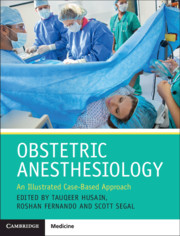10 results
Dedication
-
- Book:
- Obstetric Anesthesiology
- Published online:
- 08 March 2019
- Print publication:
- 21 March 2019, pp v-vi
-
- Chapter
- Export citation
Chapter 5 - Tips and Tricks for Labor Neuraxial Block
-
-
- Book:
- Obstetric Anesthesiology
- Published online:
- 08 March 2019
- Print publication:
- 21 March 2019, pp 19-23
-
- Chapter
- Export citation
Contributors
-
- Book:
- Obstetric Anesthesiology
- Published online:
- 08 March 2019
- Print publication:
- 21 March 2019, pp ix-xiv
-
- Chapter
- Export citation
Reference Ranges in Pregnancy
-
- Book:
- Obstetric Anesthesiology
- Published online:
- 08 March 2019
- Print publication:
- 21 March 2019, pp 274-294
-
- Chapter
- Export citation
Index
-
- Book:
- Obstetric Anesthesiology
- Published online:
- 08 March 2019
- Print publication:
- 21 March 2019, pp 295-306
-
- Chapter
- Export citation
Contents
-
- Book:
- Obstetric Anesthesiology
- Published online:
- 08 March 2019
- Print publication:
- 21 March 2019, pp vii-viii
-
- Chapter
- Export citation
Copyright page
-
- Book:
- Obstetric Anesthesiology
- Published online:
- 08 March 2019
- Print publication:
- 21 March 2019, pp iv-iv
-
- Chapter
- Export citation

Obstetric Anesthesiology
- An Illustrated Case-Based Approach
-
- Published online:
- 08 March 2019
- Print publication:
- 21 March 2019
Chapter 16 - Brain death and somatic support
- from Section 2 - General medical considerations
-
-
- Book:
- Maternal Critical Care
- Published online:
- 05 July 2013
- Print publication:
- 04 July 2013, pp 174-178
-
- Chapter
- Export citation
Contributors
-
-
- Book:
- Maternal Critical Care
- Published online:
- 05 July 2013
- Print publication:
- 04 July 2013, pp ix-xiv
-
- Chapter
- Export citation



